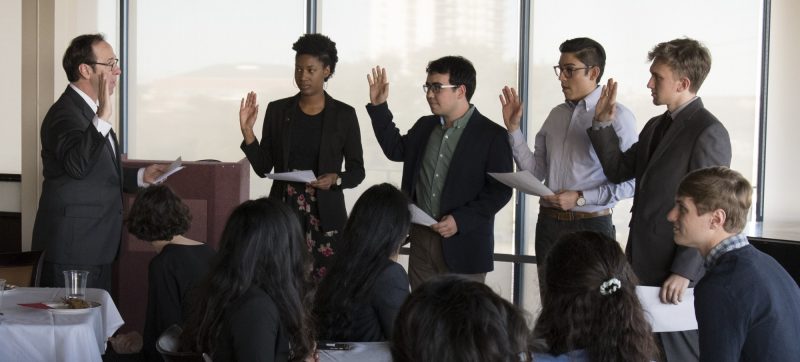This fall semester, Student Government Association (SGA) will continue to strive toward the goals they set in the spring semester, including moving forward with many different projects and initiatives.
“The fall semester serves as an opportunity for all student organizations — inclusive of SGA — to really tie up their term nicely with a bow,” said Jamie Thompson, co-advisor for SGA and director of student involvement. “SGA had several goals that they set out with for the calendar year of 2018 — one of which was transparency — so they’ll continue to communicate with the student body via their emails, via their newsletter.”
Senior Amulya Deva, SGA president, laid out what she wants each of the SGA committees to accomplish on a monthly basis so that they can reach their goals. One committee that Deva highlighted is the menstrual products committee. Junior Simone Washington, SGA senator and chair of the committee, explained that the initiative started about a year ago and that free menstrual products are now available in five on-campus bathrooms.
“The bathrooms that [menstrual products are] currently in, we want to make sure that they’re being stocked regularly,” Washington said. “We’re hammering out lots of the kinks on who does that and when they do. I don’t think a lot of students know exactly the placement of these menstrual products, so we want to be transparent and even advertise where these products are. For further semesters, we do plan to expand to Mabee [Dining Hall].”
Although the original goal for the initiative was to provide free and available menstrual products for female students, the program is also being expanded to include non-binary students by placing products in gender-neutral bathrooms.
“The menstrual products located in Northrup 0 are in a gender-neutral bathroom, and in [the Center for the Sciences & Innovation], we plan to expand to the first floor. There’s a gender-neutral bathroom there,” Washington said. “We want to make sure they’re accessible in bathrooms that non-binary and gender neutral students are using.”
Another committee that Deva mentioned is the textbook affordability committee, chaired by junior Ty Tinker, SGA senator.
“The library emailed us saying that they wanted to come up with a program offering professors grants to use open educational resources or develop their own open educational resources, so we’re going to reach out to them and see how that program has been going,” Deva said. “We are going to get three professors who will actually implement open educational resources by the end of this semester, so hopefully they’ll start using it next semester.”
SGA’s sustainability committee, chaired by senior SGA senator Julia Shults, is working to create a report benchmarking sustainability efforts at other schools and comparing those efforts to what Trinity is doing.
“After we do that research, we want to convey that not only to the student body but to administration on how we can come up with more environmentally friendly practices on campus,” Deva said.
The international students committee, chaired by junior SGA senator Juan Luevanos, is creating a survey for international students to receive feedback on how they’re feeling about support they receive from Trinity.
“We want to make sure they feel supported,” Deva said. “Being an international student comes with different challenges that we have to address if they’re coming to school at Trinity.”
This fall, SGA will also hear funding requests from registered student organizations (RSOs). RSOs include organizations such as the Black Student Union, TUFit and Trinity University Women in Computing.
SGA allocated funding to university-sponsored organizations (USOs) in April 2018. USOs and RSOs are both funded through the student activity fee, but RSOs are not able to request funds until fall — after USOs have taken their cut.
“We have a limited amount of money for the whole year, and that’s mainly determined by how many people enroll at the school,” said senior Rachel Daniel, vice president of SGA. “We’ve already set the amounts that USOs will be able to use for the whole school year. Based on what we spent on USOs, all the remaining money is what can be spent on RSOs throughout the entire school year.”
Last spring, USOs asked for $636,961.84 — over $90,000 more than the average allocation over the last five years. Therefore, all USOs saw budget cuts.
“We want to be able to fund both USOs and RSOs,” Daniel said. “USOs are serving a large percentage of the school population, and they’re what help keep campus life so vibrant, but you don’t want to take away from RSOs.”
Daniel assured that there is still funding available for RSOs.
“We are definitely going to hear every single request from organizations this upcoming year. RSOs don’t have to feel like they can’t come to us with their requests, it’s just that we’ll be limited — as we are every year — in what we can approve,” Daniel said.
RSOs can look out for an email from Daniel about when SGA will hear funding requests.







